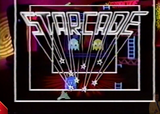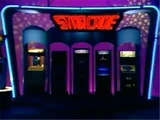| Hosts | |
| Mike Eruzione (1981) Alex Trebek (1982 Pilots) Mark Richards (1982–1983) Geoff Edwards (1983–1984) | |
| Announcer | |
| Kevin McMahon | |
| Broadcast | |
| KRON Special: 9/13/1981 Unsold Pilots for NBC: 1982 WTBS (Weekly): 12/27/1982 – 8/1983 Syndication (Weekly): 9/1983 – 2/24/1984 (reruns aired until 9/1984) | |
| Packager | |
| JM Productions | |
| Distributor | |
| TPS - Turner Program Services | |
1981 Pilot Open: "This is the world of STARCADE, where children and parents, executives and celebrities, meet to share the excitement of the sporting event of the 21st century. Man pitted against machine, in a search for the super video game player, who can meet the ever-changing challenge of STARCADE. And here now is the captain of the World Champion U.S. Olympic Hockey team, and the captain of our team, MIKE ERUZIONE!"
1982 Pilots Open: "This is STARCADE! A video arcade game show. A game show for today. And here's our host, ALEX TREBEK!"
Mark Richards Open: "This is STARCADE! TV's first arcade game show, and here is your host of Starcade, MARK RICHARDS!"
Rest of spiel (Richards): "Hello Starcaders! And welcome! We're backstage warming up for today's action, and our 2 players/teams are getting ready to compete on some very exciting video arcade games! Right now, players/teams are you about ready?" PLAYERS (OR TEAMS): "Yeah!" RICHARDS: "Then let's play Starcade!"
Geoff Edwards Open: "This is STARCADE! TV's first arcade game show. Starring your favorite video games, and some brand new ones being introduced to the public for the first time anywhere! Now here is your host for Starcade, GEOFF EDWARDS!"
Rest of spiel (Edwards): "Thank you very much, and welcome to Starcade! Here we are backstage where our 2 players/teams are warming up for today's big match, and one of them will have a chance to play to win their very own arcade game! Players/Teams, are you ready? And I know you are, then let's go play Starcade!"
Starcade was the nation's very first video arcade game show.
Gameplay[]
Two contestants (sometimes two teams of two), regardless of age, competed in a game of playing arcade games for points & prizes. The contestants were matched according to their ability in playing the games played that day. There were five arcade games per show, but only four of them were played. Occasionally, only one game was played for the whole show.
Main Game[]
Three rounds were played and, in each round, a video game question with two choices was asked. The first player/team to buzz-in with a correct answer won the right to choose a game, but an incorrect answer gave the opponent(s) a game choice. The player/team who chose the game also went first. For shows with only one game, the player/team to win the question also scored a free 100 points. The object of each game was to score as many points as possible within a time limit; each game score was added to the player/team's overall match score.
Time Limits[]
In the first two rounds, both players/teams played the selected games for 50 seconds, and in the third round, the game chosen in that round was played for 40 seconds.
When the show started, the first two video games were played for 40 seconds, and the third one was played for 30 seconds. Later, the first game was played for 60 seconds, the second game was played for 50 seconds, and the third game was played for 40 seconds. Finally it was changed to the above times.
Mystery Game[]
One of the five games was the "Mystery Game". The Mystery Game was announced to the home viewers by announcer Kevin McMahon. The player/team who choose that game at any point in the match instantly won a prize.
Name the Game[]
After the second round, the player/team in lead at that point faced the "Name the Game" board. On the "Name the Game" board monitors were four playing fields of video games. The host would present two video game choices for each field and all the contestant/team had to do was to choose the game that had that screenshot (if a team was playing this segment, they had to alternate turns). If the contestant/team named at least three games correctly, he/she/they won a prize, with a bonus prize awarded for naming all four.
NOTE: Name the Game was also played after the third & final round in the early days of the show. The player with the highest score from that round only played it.
The player/team with the highest overall point total from all three games played won the match and a prize, and went on to play one final video game for a grand prize (usually their own arcade game).
Bonus Round[]
In the bonus round, the winning player/team had a choice of the remaining two video games without even answering a question. The host gave the average scores of 20 other players who played those two games for 30 seconds, before the winning player/team made a decision. Once the choice was made, the winning player/team had just 30 seconds to play the game he/she/they chose. The object of this round was to beat the average score previously mentioned for that game in order to win the grand prize.
Invitational Shows[]
Four contestants who won their games in previous shows competed in these shows for not a video arcade game, but a trip to Hawaii or home robot.
Heats[]
In the heats, two prior winners chosen at random faced off, with all games played within a 30 second time limit. Instead of a regular video game question, a Name the Game question was played. What made the Name the Game questions different from the ones in regulation play was that one playing field was shown on all four monitors and after five seconds, that was when Geoff gave the two choices. The first player to buzz in with the correct game name chose the game/played first otherwise, the opponent got the choice/played first. Sometimes, extra points were awarded in addition to winning the question. The first set of players played twice/two games and the second set played once (sometimes twice, as well) and the two players with the highest scores went to the finals for the grand prize.
Finals[]
In the finals, one final Name the Game question was played and the winner of that question won the right to play first/choose an unchosen game. Each contestant played for a full minute and the player with the highest score won the grand prize.
Pilots[]
The original pilot for Starcade was hosted by Mike Eruzione (famous for scoring the game-winning goal for the 1980 U.S. Men's Olympic Hockey Team vs. Russia) and featured an almost entirely different format. There were three rows of eight players (24 in total) and their own separate arcade game systems. All three rows featured a different video game; in this case, the first one featured eight Defender systems, the second one featured eight Centipede systems, and the third one featured eight Pac-Man systems. Each player had 30 seconds to accumulate a relatively high total. Whoever had the highest out of all eight on their team was selected to play against the two other highest-scoring players on an arcade game (Berzerk in this case) for the grand prize—their very own arcade game (Asteroids Deluxe, in this case) and an Apple II Home Computer System.
Afterwards, the overall winner would play a brand-new arcade game against a celebrity "just for fun". The winner, David Dyche, played the then-brand new video arcade game Donkey Kong against Larry Wilcox, who was known to television fans as police officer Jon Baker on the NBC crime-drama CHiPs.
The original pilot was conceived to sell to NBC, who passed.
The Alex Trebek Pilots[]
Three more pilots were shot, featuring a retooled format (more similar to the one described in the above sections) and host Alex Trebek.
In these pilots, the two contestants involved played four games instead of three, in two rounds of gameplay (two games each round). The first two games were played for 40 seconds, and the last two games were played for 30 seconds. There were no toss-up questions in these pilots. Also the games were hidden behind curtains numbered 1-4; the fifth game was a mystery marked with a question mark (?). The four games were identified by their playing fields, while the mystery game was identified by its sound.
In each half of the round, one player chose a game by number, the game was revealed, and the first player played it, followed by the second player. The object of each game was to score more points than the opponent. If the game picker won, s/he scored bonus points times the number of the game. The mystery game was worth 5000 bonus points to the player who picked it first and won.
After each round, the played with the combined total score from both games won the right to play Name the Game, which was played differently. The player had 20 seconds to name up to four games but with no choices for each game. Now the player only got one shot at answering each game, but if s/he can't think of an answer, s/he it up can come back to it if there was time. The more they get right, the bigger the prize.
The winner of the match went to play the only game unselected for a grand prize. For one of the pilots, it was their own Qix game.
The pilot was picked up by Ted Turner in 1982, and the show began its life on the WTBS superstation that same year.
Planned Reboot[]
On December 3, 2022, it was mentioned that a reboot[1]of this show was planned in the works for the G4 streaming network with Jirard Kahalil (a.k.a "The Completionist") set to host when it was revealed during an unofficial XPlay reunion on Kinda Funny Games platforms on November 15. However, it never got off the ground since the rebooted streaming network itself flopped.
Lyrics to the Starcade Rap (G4 era)[]
Hu-manoid, your moves are so fresh,
Your presence is requested for the ultimate quest!
Hop on board and turn my key,
We're gonna flashback to 8-T-3!
Rock my controller, Don't get played,
You are the new master of Starcade!
Rating[]
Stations[]
- Atlanta - WTBS (now WPCH-TV)
- Chicago - WPWR-TV
- New Haven - WTNH
- Cleveland - WJKW (now WJW-TV)
- Detroit - WXON (now WMYD)
Music[]
Mindseed
Taping Location[]
Bridge Studios, San Francisco, CA
Inventors[]
James Caruso & Mavis Arthur
Additional Pages[]
Starcade/Picture Gallery
Starcade/Video Gallery
Links[]
Official Website (New)
Official Website (Older)
Starcade @ Game Show Utopia
Chuck Donegan's Rules for Starcade
Jay Anton's Starcade Rules Page
RetroBlast! - The History of Starcade
Starcade: the arcade game show @ RetroCRUSH
Starcade @ Obsolete Gamer
Dragon's Lair Project - Starcade retrospective


